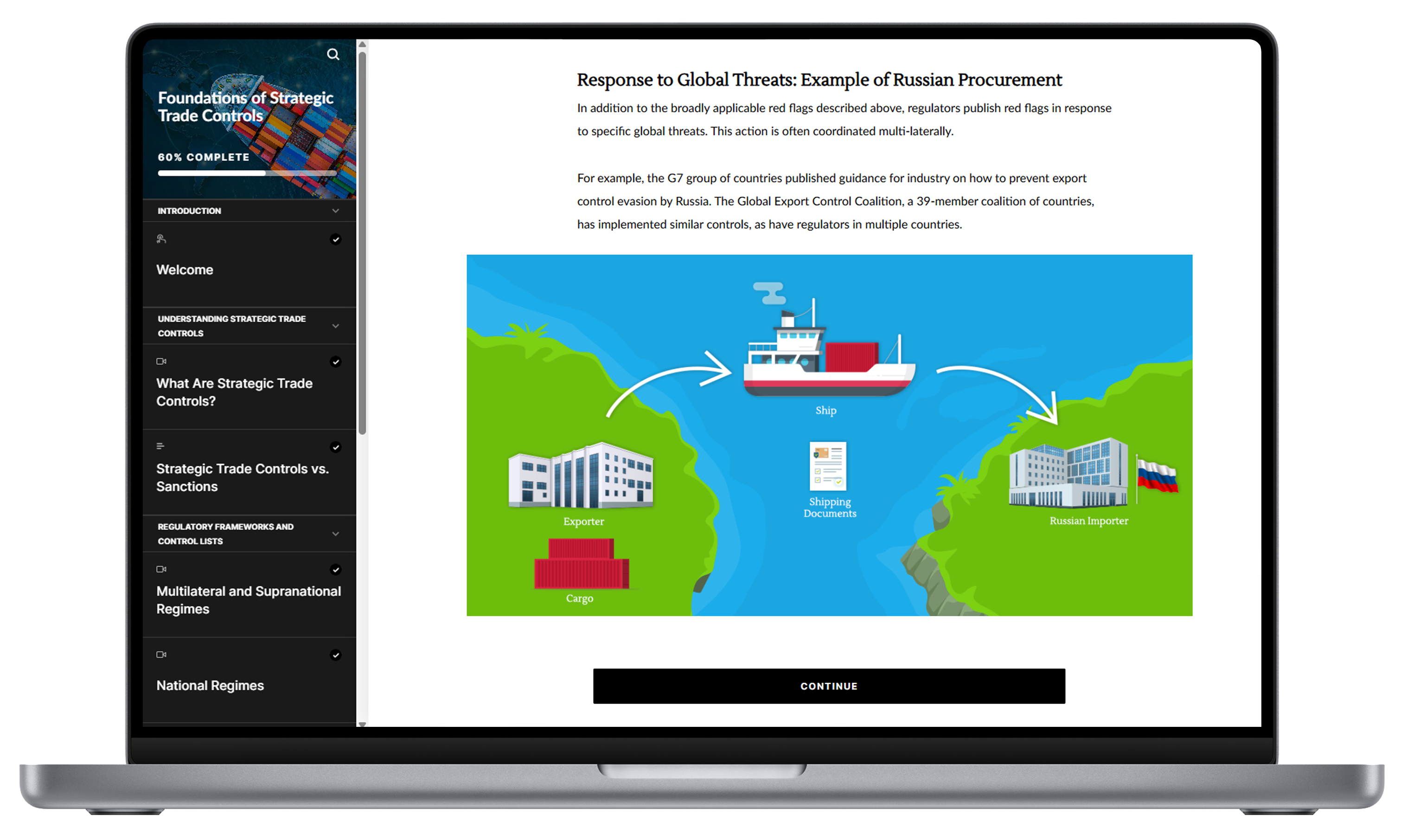Intensifying Focus on Export Control Compliance by Banks
Actions Financial Institutions Can Take to Achieve Compliance
📅 April 16, 2025
📅 April 16, 2025
The U.S. Commerce Department’s Bureau of Industry and Security (BIS) has intensified its focus on the responsibility of financial institutions not to finance trade that violates the Export Administration Regulations. Most notably, in October of last year, BIS issued detailed New Guidance for financial institutions.
Export controls also continue to be a priority for the new administration: on January 20, 2025, the President issued the America First Trade Policy highlighting the need to “maintain, obtain, and enhance” the United States’ technological edge by making recommendations on the export controls policies, practices, and enforcement mechanisms.
What does this signal for banks and export controls in 2025?
With BIS’ intensifying focus on financial institutions, we may see the first enforcement action against a bank. If this occurs, what are the indicators of what BIS may target first?
What is the BIS Entity List?
The BIS Entity List specifies foreign entities and individuals prohibited from receiving some or all items subject to the Export Administration Regulations. Entities and individuals are added to the list due to the increased risk of diversion of items to weapons of mass destruction (WMD) programs, sanctioned activities, or actions contrary to U.S. national security or foreign policy.
The Entity List is different from OFAC’s Specially Designated Nationals and Blocked Persons (SDN) list, which is used to administer economic sanctions. The individuals and entities on the BIS Entity List are subject to specific license requirements for the export, reexport, or transfer of specified items, whereas the persons on the SDN List are subject to asset freezes.
Let’s step through some of the key points on the timeline of BIS’s directions for financial institutions and then consider the implications for financial institutions.
On June 28, 2022, a joint alert was issued by FinCEN and BIS. The alert was issued in response to Russia’s further invasion of Ukraine and the export controls imposed to restrict its access to “specific technologies and other items it needs to sustain its military activity”.
The alert contained:
On March 2, 2023, a Joint Compliance Note was issued by the Department of Commerce, Department of the Treasury, and Department of Justice. The note focused on the use of third-party intermediaries and transshipment points to obscure the involvement of Russian end users.
The note contained:
On May 19, 2023 a Supplemental Alert was issued to add to and extend the guidance from June 2022 and to “urge continued vigilance for potential Russian export control evasion attempts.”
The alert contained:
On November 6, 2023, another joint alert was issued by FinCEN and BIS, adding and updating their earlier alerts. This alert contained:
On February 23, 2024, BIS issued the Common High Priority List. This was developed jointly with the European Union, Japan, and the United Kingdom. The list specifies items at heightened risk of diversion to Russia because of their importance to Russia’s war efforts. The list has been updated several times since.
On October 9, 2024, BIS issued new guidance for financial institutions. This represents the most extensive and focused guidance yet for financial institutions. The guidance includes:
An export control compliance program should not require a financial institution to build a new framework from the start. However, it would be prudent to take a structured approach to the requirements articulated by BIS and FinCEN to minimize risks of non-compliance.
As part of an institution’s compliance program, a Chief Compliance Officer should:

Author
Catherine Woods is an Associate Managing Director at the Institute for Financial Integrity where she leads content development on emerging technologies, export controls, and other counter-illicit finance domains. For more information about our courses and services, please contact info@finintegrity.org.

Our course Foundations of Strategic Trade Controls offers a comprehensive overview of how to understand and apply strategic trade control requirements, with a particular focus on those applicable to financial institutions.
Learn more and strengthen your compliance skills today.










 Cartels, Cash, and Capital Flows
Cartels, Cash, and Capital FlowsThis site uses cookies. By continuing to browse the site, you are agreeing to our use of cookies.
Accept settingsHide notification onlySettingsWe may request cookies to be set on your device. We use cookies to let us know when you visit our websites, how you interact with us, to enrich your user experience, and to customize your relationship with our website.
Click on the different category headings to find out more. You can also change some of your preferences. Note that blocking some types of cookies may impact your experience on our websites and the services we are able to offer.
These cookies are strictly necessary to provide you with services available through our website and to use some of its features.
Because these cookies are strictly necessary to deliver the website, refusing them will have impact how our site functions. You always can block or delete cookies by changing your browser settings and force blocking all cookies on this website. But this will always prompt you to accept/refuse cookies when revisiting our site.
We fully respect if you want to refuse cookies but to avoid asking you again and again kindly allow us to store a cookie for that. You are free to opt out any time or opt in for other cookies to get a better experience. If you refuse cookies we will remove all set cookies in our domain.
We provide you with a list of stored cookies on your computer in our domain so you can check what we stored. Due to security reasons we are not able to show or modify cookies from other domains. You can check these in your browser security settings.
These cookies collect information that is used either in aggregate form to help us understand how our website is being used or how effective our marketing campaigns are, or to help us customize our website and application for you in order to enhance your experience.
If you do not want that we track your visit to our site you can disable tracking in your browser here:
We also use different external services like Google Webfonts, Google Maps, and external Video providers. Since these providers may collect personal data like your IP address we allow you to block them here. Please be aware that this might heavily reduce the functionality and appearance of our site. Changes will take effect once you reload the page.
Google Webfont Settings:
Google Map Settings:
Google reCaptcha Settings:
Vimeo and Youtube video embeds:
You can read about our cookies and privacy settings in detail on our Privacy Policy Page.
Privacy Policy